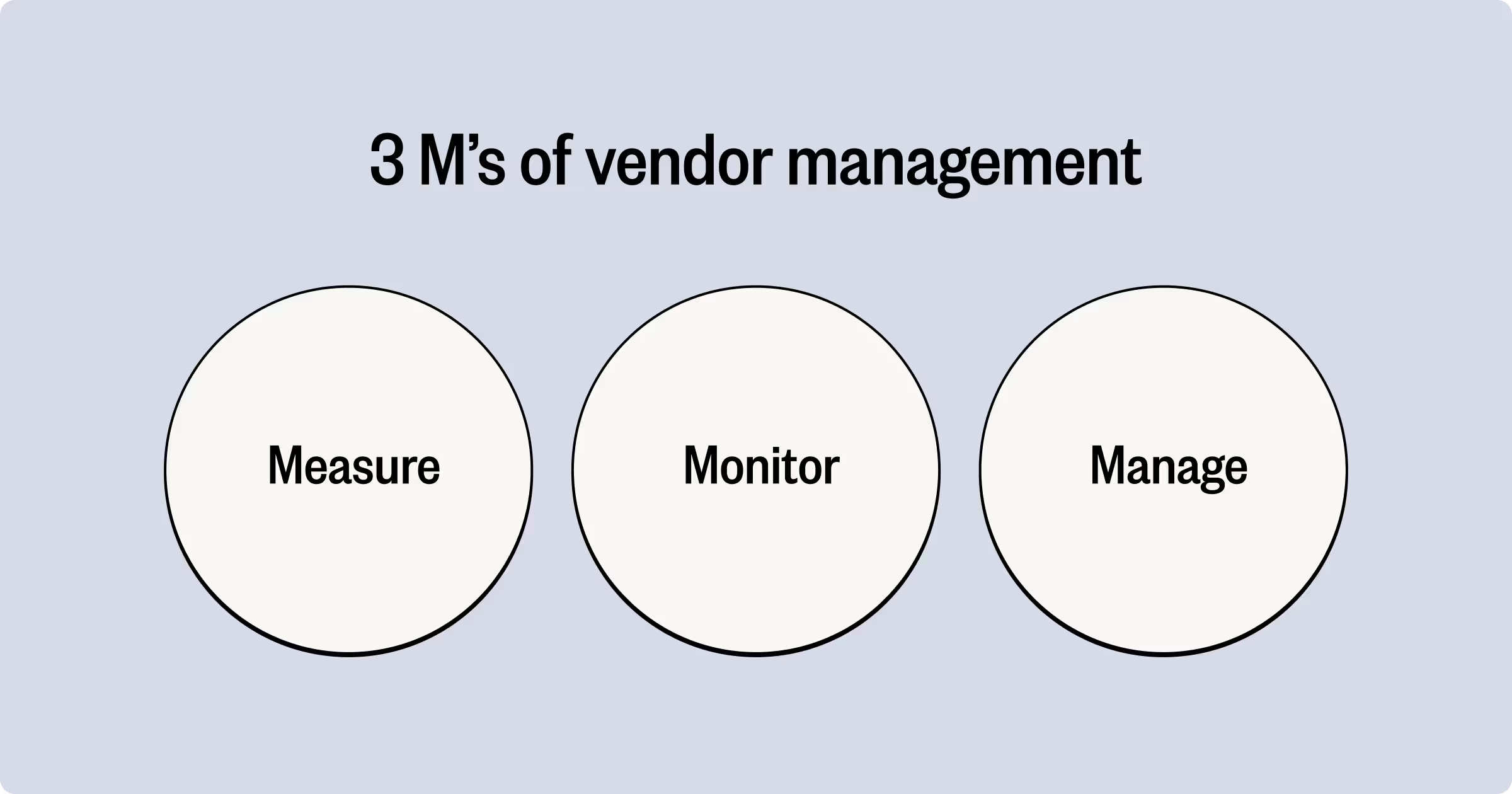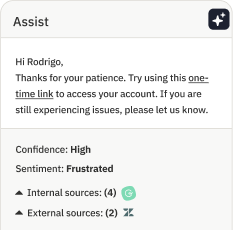How to turn your BPO agents into team players

As support operations scale and evolve, the lines between in-house and BPO agents are blurring — especially in a world where agility is key. The most successful support teams treat their BPO agents not as external resources, but as fully integrated members of the team.
With the right strategy, your BPOs can not only help you handle peak demand but also become a natural extension of your internal team, sharing in the same goals and delivering consistent customer experiences. Here’s how to make that happen.
6 steps to make BPO agents feel like part of your internal team
1. Build a strong BPO management system
A well-run BPO partnership doesn’t happen by accident — it starts with a solid vendor management system. Whether you’re a small support team wearing multiple hats or a larger operation with an established vendor management function, you need a clear point of contact responsible for collaborating with your BPO provider. This role is crucial for ensuring that your expectations are aligned, and your BPO teams are working as seamlessly as your internal agents.
For smaller teams, this might mean designating a current team member or even taking on the responsibility yourself. For larger organizations, it’s about working closely with your vendor management team to foster tight collaboration between your internal support operations and the external BPO.
To get the most out of your BPO partnership, focus on the three pillars of effective vendor management.

- Measure: Set clear, measurable goals for your BPO agents, just as you would for your internal teams. This helps ensure everyone is aligned and working towards the same targets.
- Monitor: Keep track of performance by negotiating detailed reporting from your BPO provider, enabling you to identify trends and act quickly to address any gaps.
- Manage: Lead with transparency and consistency. Regularly review performance against your expectations and hold your BPO accountable for delivering top-tier service — while also maintaining an open and collaborative relationship.
2. Stay connected with your BPO — virtually and onsite
In a hybrid, global workforce, maintaining strong connections with your BPO partners is critical to keeping your teams aligned. Whether it’s visiting their location in person or setting up regular virtual check-ins, face time matters. Before you sign a contract, make sure to visit your BPO provider’s site to get a feel for their operations and team dynamics. Post-engagement, keep that connection going with regular site visits or virtual tours to maintain visibility and trust.
When you’re onsite, don’t just focus on processes — immerse yourself in their day-to-day. Look for how they manage workforce operations like scheduling and adherence, and pay attention to the tools they’re using. Are they using the same systems as your internal agents? Are their working conditions optimized for performance? If you see areas where improvements can be made, collaborate on solutions — your involvement helps bridge the gap between internal and BPO teams.
Want to take it a step further? Bring a few internal support agents on these visits, or even invite BPO agents to your own office. These touchpoints can foster a sense of belonging, building a shared team culture. You can also get creative with things like branding the BPO workspace with your company’s logo or colors — small gestures that go a long way in making BPO agents feel like an extension of your team. The stronger the connection, the better the outcomes for your customers.
3. Own the training process for your BPO agents
While your BPO provider may handle day-to-day logistics like clocking in, attendance, and staffing, there’s one area you should always own: training. If your BPO agents are going to represent your brand, they need the same high-quality training as your internal support team. This ensures consistency across the board, so customers experience the same level of service, no matter who’s assisting them.

Treat onboarding BPO agents just as seriously as onboarding internal hires. Studies have shown that strong onboarding can boost productivity by up to 70%, so making the effort upfront pays dividends in the long run. The goal is to set clear expectations, align BPO agents with your support culture, and ensure they’re well-versed in your systems and tools from day one.
And training doesn’t stop after onboarding. Continuous education is key to keeping BPO agents up to speed on new products, services, and support protocols. Make sure any new training your internal team receives is mirrored for your BPO agents — this creates parity and helps them feel just as valued and capable. Since this can go beyond what your BPO provider might typically offer, it’s worth negotiating an expanded training schedule early in your partnership.
By investing in your BPO agents’ training, you’re sending a clear message: they’re an important part of your support team. This not only levels the playing field but also drives better outcomes for your customers by ensuring every agent has the tools, knowledge, and confidence to succeed.
4. Empower BPO agents with full access to information
To set your BPO agents up for success, they need more than just training — they need access to the same information and tools as your internal team. The more informed they are, the better they can deliver the high-quality support your customers expect. Whenever possible, ensure BPO agents have full access to the resources they need, from product documentation to customer insights, and make sure they’re using the same software and tools as your in-house agents.
Of course, legal and regulatory constraints can come into play, especially when handling sensitive data like Personally Identifiable Information (PII). While you may not be able to share everything, the goal should be to provide as much access as possible within the boundaries of compliance. This not only ensures your BPO agents can work efficiently but also reinforces that they’re a valued part of your team.
Providing equal access to information also enhances the agent experience. When BPO agents have the same knowledge base as internal agents, they feel more empowered, confident, and engaged. Sharing uniform support tools makes it easier for internal and external teams to collaborate and ensures a consistent customer experience across the board.
5. Recognize and reward your BPO agents’ performance
Recognition is a powerful motivator. Whether they’re in-house or part of your BPO team, everyone wants to feel valued for their contributions. If you already have a recognition program in place for your internal team, it’s time to extend it to your BPO agents as well.
Start by using the same metrics to measure the performance of both internal and BPO agents. Whether it’s CSAT scores, adherence to SLAs, or first-call resolution, your BPO agents should be evaluated — and celebrated — on equal terms. This sends a clear message that they’re part of the same team, working toward the same goals.
When it comes to rewards, consistency is key. If you offer bonuses, prizes, or incentives for high performance internally, work with your BPO provider to offer the same rewards to your external agents. Make sure any bonuses or prizes go directly to the high-performing BPO agents, not the provider, and put these terms in writing to ensure transparency.
Recognizing and rewarding BPO agents the same way you do your internal team creates a sense of belonging and boosts morale. It’s a simple way to build a more cohesive support operation while ensuring your entire team is motivated to deliver excellent customer service.
6. Foster connection and celebrate wins
Socialization is key to building a strong support team, and that includes your BPO agents. The opportunity to connect with colleagues makes a significant difference in job satisfaction. Whether it’s scheduled breaks, virtual team-building, or in-person meetups, finding ways for your BPO agents to socialize with one another and with your internal team is crucial to creating a sense of belonging.
Work with your BPO provider to ensure agents are given time and space to build these connections. Like everything else, it’s a good idea to get this in writing during contract negotiations to ensure these opportunities are structured into their workday.
Celebrating milestones and achievements is another simple but effective way to build camaraderie and show your BPO agents that their contributions matter. If you're hosting an internal team event, find a way to include your BPO agents — whether that’s inviting them to join in virtually or coordinating with your BPO provider to hold an onsite celebration. These moments of recognition can strengthen your BPO agents’ sense of ownership and pride in their work.
You don’t have to plan a major event for this to have an impact. Even a visit from your company’s leadership team with some branded swag or a few words of appreciation can go a long way in showing your BPO agents they’re an important part of the team. These small gestures make a big difference in creating a positive, engaged workforce that feels valued.

Bring your BPO agents closer to home
Building a seamless connection between your internal and BPO support teams is no small feat, but with the right strategies in place, it’s entirely possible. By setting clear expectations, fostering open communication, and treating your BPO agents as true partners, you’ll create a cohesive, high-performing team that delivers excellent customer service across the board.
As your operations scale, managing these relationships becomes even more critical. That’s where Assembled Vendor Management comes in — empowering you to stay in sync with your BPO providers, track performance, and ensure your support teams are aligned.
Ready to see how Assembled can help you take control of your vendor management? Take a self-guided demo today and discover how you can streamline your BPO partnerships for better outcomes.





